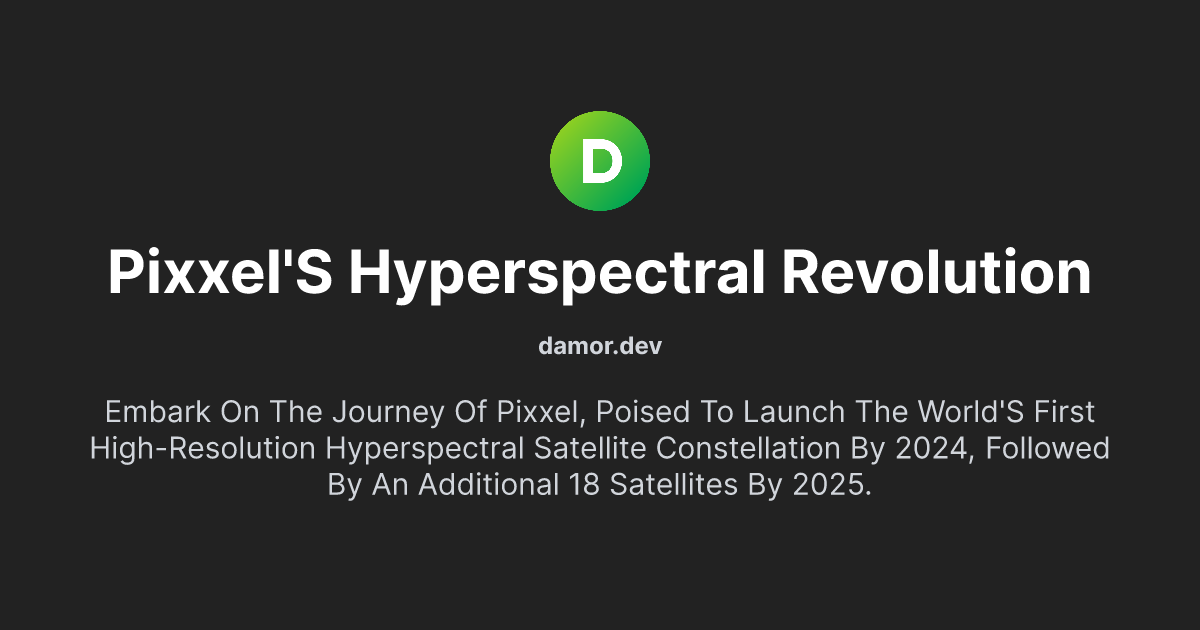Pixxel's Hyperspectral Revolution

Pixxel's Hyperspectral Journey Unveiled
Get ready for a groundbreaking development in satellite technology! Bengaluru-based Pixxel, India's trailblazing private satellite company, is gearing up to launch the world's first hyperspectral satellite constellation by 2024. This constellation, named Firefly, consists of six high-resolution hyperspectral satellites, designed specifically for geospatial study and analysis.
Unlike conventional satellites that capture data within a limited range, Pixxel's hyperspectral imaging system operates on a different level. It can decipher information in hundreds of wavelengths, around 300 units in Pixxel's case. In simpler terms, this means it can break down light into very thin wavelength bands, allowing the capture of a wide array of information from the electromagnetic spectrum.
Applications Across Industries
The applications are diverse and impactful:
- In agriculture, Pixxel's satellites identify crops, assess nutrient content in soils, gauge moisture levels, and analyze chlorophyll content, enabling precision farming.
- In the oil and gas sector, these satellites detect methane leaks and differentiate between minerals, providing valuable insights for mining companies.
- In forestry, they monitor pollution levels, track biodiversity changes, and identify pest infestations and tree species.
One remarkable feature of Pixxel's hyperspectral satellite is its global coverage with the ability to revisit any location on Earth within a 24-hour cycle. Pixxel isn't just observing; they're transforming industries by offering insights that empower decision-makers worldwide.
Overcoming Data Challenges
However, handling the massive amount of data these satellites generate presented challenges. Pixxel tackled this by evolving its hardware, implementing compression algorithms, and optimizing storage systems. The result is a reliable and accurate system for capturing, storing, and processing hyperspectral data.
Company Overview
Pixxel, founded in 2019, has raised over $70 million and expanded to 175 employees globally. The recent funding will not only support the deployment of 18 additional satellites by 2025 but also advance Aurora, Pixxel's AI-driven analytics platform. This platform aims to democratize hyperspectral analysis, making it more accessible to a broader audience.
Pixxel's partnerships with tech giants like Google, Microsoft, and Amazon play a crucial role in their operations. These partnerships provide access to cloud infrastructure and data marketplaces, enhancing data delivery and accessibility for users worldwide.
The Future: Firefly Series
With the upcoming Firefly series, Pixxel is entering a new era of satellite technology. These larger, more advanced satellites promise enhanced resolution, extended lifespans, and superior performance, paving the way for a quantum leap in global-scale commercial operations.
Global Expansion Strategy
Pixxel's global expansion strategy targets key markets in the United States and Europe, with plans for further penetration into emerging markets. The $36 million in Series B funding will amplify Pixxel's capacity for data collection, solidifying its position at the forefront of the space technology revolution.


![[Solved] ZlibError:zlib:
unexpected end of file - payload](/content/images/size/w600/2024/02/Screenshot-2024-02-18-143905.png)


